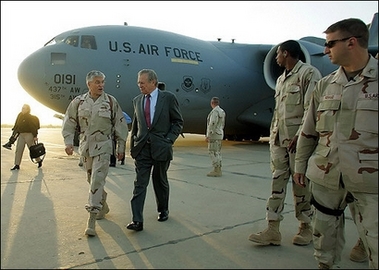The Pentagon has notified about 21,000 Army soldiers and Marines that they
are scheduled to be sent to Iraq late this year as part of the latest deployment
rotation.
Four major combat brigades from Texas, Alaska and Colorado are scheduled to
replace troops returning home from the war, the Pentagon said. Thus, the
announcement does not signal an increase in troop strength in Iraq.

US Defense Secretary Donal Rumsfeld (C) and US
Army General George Casey (2nd L) seen here at Baghgad International
Airport in April 2006. Rumsfeld is set to meet with the top American
military commander in Iraq here for two days of talks, starting Wednesday,
that are expected to review prospects for US troop reductions this year.
[AFP] |
In a press release Tuesday, the Pentagon said the planned assignments could
change depending on the conditions in Baghdad. The move comes as Pentagon
officials and the Bush administration are under increasing pressure from
Congress and the public to begin withdrawing troops from Iraq.
Combined with last November's announcement of 92,000 American service members
scheduled to go to Iraq in the 2006-2008 rotation, this would bring the total
U.S. troop level to about 113,000 for that period. That is less than the
approximately 138,000 average troop level for the past year, but more than
military officials' goal of less than 100,000 by the end of the year.
There are about 127,000 US troops in Iraq.
Not all of the units in the first 92,000 have gone to Iraq yet. A
Germany-based Army brigade's travel to Iraq was put on hold just last month —
triggering talk that a US troop cut might be in the offing. They are now
scheduled to go this summer. And a Fort Lewis, Washington, brigade began
shipping equipment to Iraq this month and the soldiers are expect to follow
soon.
The moves suggest that US commanders are sticking largely to their original
troop rotation plan for this year, leaving unclear when and if a sizable
reduction in U.S. troop levels will begin.
Defense officials said the announcement makes no major changes to the number
of troops in Iraq and should not be interpreted as a move to either decrease or
increase the size of the military there.
"Force levels in Iraq continue to be conditions-based and will be determined
in consultation with the Iraqi government," the announcement said. "Changes may
be made that could affect units now being identified and advised to prepare to
deploy."
The decision was made by Defense Secretary Donald H. Rumsfeld, based on
recommendations by commanders in the field.
The units are: 3rd Corps Headquarters, 1st Cavalry Division Headquarters, the
2nd Brigade of the 1st Cavalry Division, and the 3rd Brigade of the 1st Cavalry
Division, all from Fort Hood in Texas; the 2nd Marine Expeditionary Force from
Camp Lejeune, N.C.; the 4th Brigade, 25th Infantry Division from Fort Richardson
in Alaska; and the 2nd Brigade, 2nd Infantry Division, from Fort Carson in
Colorado.